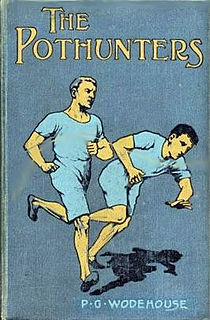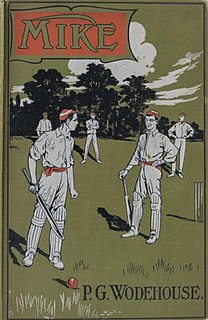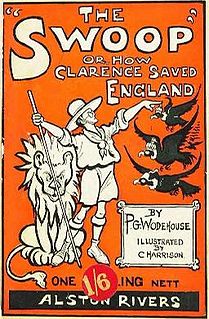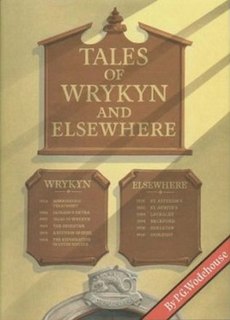
Fagging was a traditional practice in British public schools and also at many other boarding schools, whereby younger pupils were required to act as personal servants to the oldest boys. Although probably originating earlier, the first accounts of fagging appeared in the late seventeenth century. Fagging sometimes involved physical abuse and/or sexual abuse. Although diminishing in its severity over the centuries, the practice of virtual enslavement of junior pupils by their seniors continued in some institutions until the last decades of the 20th century.

Nothing Serious is a collection of ten short stories by P. G. Wodehouse. It was first published in the United Kingdom on 21 July 1950 by Herbert Jenkins, London, and in the United States on 24 May 1951 by Doubleday & Co., New York. It was published again in 2008 by The Overlook Press.

Rupert Psmith is a recurring fictional character in several novels by British author P. G. Wodehouse, being one of Wodehouse's best-loved characters.
The following is a list of short stories by P. G. Wodehouse grouped by the main series to which they belong, if applicable.

"The Great Sermon Handicap" is a short story by P. G. Wodehouse, and features the young gentleman Bertie Wooster and his valet Jeeves. The story was published in The Strand Magazine in London in June 1922, and then in Cosmopolitan in New York that same month. The story was also included in the collection The Inimitable Jeeves as two separate stories.

The White Feather is a novel by P. G. Wodehouse, first published on 9 October 1907 by A & C Black, London. It is set at Wrykyn school, scene of Wodehouse's earlier book The Gold Bat (1904), and the later Mike (1909). Like many early Wodehouse novels, the story first appeared as a serial in the boys' magazine The Captain, between October 1905 and March 1906. The phrase "white feather" is a reference to cowardice.

Stiff Upper Lip, Jeeves is a novel by P. G. Wodehouse, published in the United States on 22 March 1963 by Simon & Schuster, Inc., New York, and in the United Kingdom on 16 August 1963 by Herbert Jenkins, London. It is the ninth of eleven novels featuring Bertie Wooster and his valet Jeeves.

The Pothunters is a novel by P. G. Wodehouse published on 18 September 1902 by Adam & Charles Black. It was Wodehouse's first published novel, and the first of several school stories, this one set at the fictional public school of St. Austin's. It was originally published as a serial in the British magazine Public School Magazine from January to March 1902. An American edition was issued from imported sheets.

A Prefect's Uncle is an early novel by author P. G. Wodehouse, one of his school stories for children. It was first published on 11 September 1903 by A & C Black. An American edition was issued by Macmillan from imported sheets in October 1903.

Tales of St. Austin's is a collection of short stories and essays, all with a school theme, by P. G. Wodehouse. It was first published on 10 November 1903 by Adam & Charles Black, London, all except one item having previously appeared in the schoolboy magazines, The Captain and Public School Magazine.

Mike is a school story by P. G. Wodehouse, first published on 15 September 1909 by Adam & Charles Black, London. The story first appeared in the magazine The Captain, in two separate parts that were collected together in the original version of the book; the first part, originally called Jackson Junior, was republished in 1953 under the title Mike at Wrykyn, while the second half, called The Lost Lambs in its serialised version, was released as Enter Psmith in 1935 and then as Mike and Psmith in 1953. Although Mike was one of Wodehouse's earlier books, Wodehouse thought it his best work.

The Head of Kay's is a novel by English author P. G. Wodehouse. The novel was published on 5 October 1905 by A & C Black. The Head of Kay's was first published as a serial in The Captain from October 1904 to March 1905.

Love Among the Chickens is a novel by P. G. Wodehouse, first published as a book in the United Kingdom in June 1906 by George Newnes, London, and in the United States by Circle Publishing, New York, on 11 May 1909. It had already appeared there as a serial in Circle magazine between September 1908 and March 1909. The English edition was dedicated "to Sir Bargrave and Lady Deane"; the Rt Hon Sir Henry Bargrave Deane QC was a High Court judge and a cousin of Wodehouse's mother.

The Swoop!, or How Clarence Saved England is a short comic novel by P. G. Wodehouse, first published in the United Kingdom by Alston Rivers Ltd, London, on 16 April 1909. Its subtitle is A Tale of the Great Invasion.

Money in the Bank is a novel by P. G. Wodehouse, first published in the United States on 9 January 1942 by Doubleday, Doran, New York, and in the United Kingdom on 27 May 1946 by Herbert Jenkins, London. UK publication was delayed while Wodehouse was under suspicion of collaboration during the Second World War. The book was published in English in Germany in August 1949 by Tauchnitz.
Durban High School is an all-boys public school in Durban, South Africa.

The culture of Yorkshire has developed over the county's history, influenced by the cultures of those who came to control the region, including the Celts, Romans, Angles, Vikings and Normans. Yorkshire people are said to have a strong sense of regional identity and have been viewed to identify more strongly with their county than their country. The Yorkshire dialect and accent is distinctive, although use of dialect words is receding.
"The Bishop's Move" is a short story by the British comic writer P. G. Wodehouse. A part of the Mr. Mulliner series, the story was first published in August 1927 in Liberty in the United States, and in September 1927 in The Strand Magazine in the UK. It also appears in the collection Meet Mr. Mulliner.

Tales of Wrykyn and Elsewhere is a collection of short stories by British writer P. G. Wodehouse, first published on 1 October 1997 by Porpoise Books, London, with illustrations by T. M. R. Whitwell. It contains previously uncollected work, most of the stories having first appeared in the schoolboy's magazines such as The Captain and Public School Magazine. It was reprinted by Penguin Random House under its Everyman's Library imprint in 2014.
















